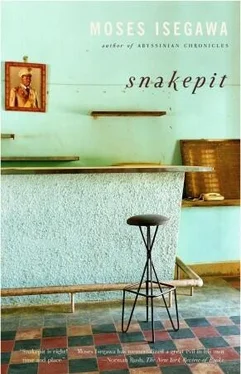General Bazooka could not concentrate. During the first few days he got no chance to send a message home. The phones did not work, the radio messages were intercepted, the men were untrustworthy. When he finally sent men to check what was happening, they were waylaid and killed by the Eunuchs, leaving him in limbo. Over the years he had been looking forward to the chance to relive the adrenaline rush of the days before the coup. The incredible pressure, the fear of betrayal, the possibility of dying in action, the glowing beacon of victory. He wanted to explode and lose control for some delicious hours, and sow destruction with impunity. But now that the time had come, he found out that things had changed. There was no excitement, there was nothing to look forward to, no country to take over, no enemies to hunt down, no women to violate, no new experiences to be had. All he felt now was fear of the Marshal, and contempt and hatred for him. He looked down upon himself for landing in this predicament, for failing to shoot the Marshal, for obeying that terrible major and his killers. This was a lost war, because Marshal Amin had failed to keep things together. He had no plan, no talent for leadership. It had all along been a ride on the back of a mad bull, holding on for as long as possible.
He marched through the towns he had captured years ago and felt disgusted. The sound of guns offered no comfort, no solace, no signal to charge. They were scared guns. The hills had already been surrendered, the valleys a carpet for the invaders to walk on. The south-west was gone. He felt no desire to sacrifice these loathsome men just to give a lost cause a few more breaths of life. At any other time he would have enjoyed flogging them, maybe even wringing their necks. Now he wanted them gone, out of his sight. Many were deserting, disappearing in the night. They would rather risk capture and flogging or death than face the guns. He got on the radio to the Defence Council, but there was no one home on the hotline. At that moment he decided to go back to the city and rescue his family.
The city was unrecognizable: it was full of soldiers driving Stingers at breakneck speed escorting this or that fleeing officer, firing at buildings, shadows, vultures and marabou storks, looting, making themselves scarce. Everybody was hurrying or looking over their shoulder. The streets were deserted, strewn with hills of garbage. At the hospital he bounded up the stairs to Ward 6. The hospital stank, was full of empty-eyed patients searching for doctors, lying in the corridors of crowded wards, praying, consoling damaged children, women, the elderly. Ward 6 had lost its status: it was full of poor patients on soiled sheets, some on beds, most on the floor. His wife’s bed was occupied by a one-eyed old woman. He rushed out to search for doctors. He learned that the Eunuchs had taken his wife away. He saw the name of Major Ozi on the release forms. He imagined how they had handled that fragile body and he shivered. The doctors knew nothing about his children or mother.
He tore through the city at top speed. The Boomerang took corners wildly, and at the roundabout it just sped through the stationary cars, horn blowing, full lights on. It climbed the hills of Kasubi at suicidal speed. All the houses formerly occupied by his friends were empty, looted, strewn with discarded paper, rags, and shit somebody or a group of people had diligently trowelled on the walls. His wife’s home had suffered a similar fate: total desecration. The floors in every room had been dug up, so that one walked on chunky blocks of cement, the doors and windows pulled out and left hanging. He made his way to the basement in a daze, lower lip trembling, his stomach full of gas. There was a huge crater, coffin-shaped, where the gunny sack packed with fifty- and hundred-dollar bills had been. Millions. Gone. He felt something break inside him, an overpowering weariness that turned his legs to jelly. This, on top of all the other catastrophes! It was too much even to cry over. He knew that the Eunuchs had destroyed him and had left no clue as to the whereabouts of the fifty people on the hill.
It crossed his mind that they had all been killed. Fifty heads on a heap. And it was his fault. This civilian consideration shocked him. He had lived above the law for so long, out of bounds of civilian strictures, that it amazed him to look at himself and judge his actions according to the same. Could I have been betrayed to this extent? To the core of my identity? So fast? In less than ten days? he wondered aloud. The pain in his four-toed foot increased. The fact that he had honoured the wager, severed his toe, now struck him as a harbinger of a fall he should have foreseen. Normally, he would have laughed at the other general and compensated him with money or a cow or a car, but not gone to the extent of desecrating his body. Where had the man thrown his toe? He had taken it away in a polythene bag.
As he staggered from the empty house, he felt the final pangs of rejection: These hills, valleys, rivers, these people, had all rejected him, and pushed him back to where his ancestors had come from. He was already erased from memory. A new conqueror would soon be here, his minions cleaning and scrubbing, and filling the houses with household goods. His princedom had already gone, the bottom eaten out during the last ten days. Now he feared for his mother’s business and for her life. In her house another sackful of dollars had been buried. It was his only salvation now. Without it he would be back to zero. The only reminder of his past success would be the ever-faithful Oris Autocrat on his wrist.
As he left the hill and the city, it struck him that there were eight, nine, ten children of his somewhere in these hills. Children with southern blood in them, children he had at one time craved but had ignored when they came. His legacy to the south, belonging nowhere and everywhere. He had met some of them, given them names, and coins to buy things. Others he had denied with impunity. What could peasants do to a prince? Before leaving the city for good, he found himself driving to two addresses where two of his children lived. He wanted to take these two, and their mothers, just in case. He did not want to leave empty-handed. He might learn to love them just to keep going. He might turn them into soldiers to empty their wrath on these hills at some later date. He needed them; they were his, after all.
At the first address, a house near the road, the place was deserted. Doors and windows had been knocked out, everything emptied. He felt himself grow faint. At the second address, he was informed by the landlord that the woman had left three weeks ago with her child. She had fled to a village about two hundred kilometres away. He suddenly felt very old and very weary. Pictures of men about to meet their death came to him: he remembered those who could hardly walk, dragging frail bodies which seemed to weigh a ton. He recognized the feeling; he could hardly move. Without looking the landlord in the eye, he trudged back to his Boomerang and asked his bodyguard to drive away. As he left, he felt that the south had repossessed everything it had ever given him.
In Jinja the face of destruction met him at his mother’s home. The house had been reduced to rubble by fire. He made his way to the basement, his heart racing. The false floor had been lifted away. The money gone. In its place were piles of relatively fresh shit. He vomited. The Eunuchs. Major Ozi. He went to the barracks to ask where his family was. He asked a trusted officer, a tribesman; he said that he did not know. He went to the headquarters of the Eunuchs. In the compound were about two hundred men armed to the teeth, the majority wearing hundreds of bullets on chains. They stopped him at the gate. He was out of bounds. No information. No sign of Major Ozi. He tried to get in touch with the Marshal on the hotline. The line was dead. He knew that the Marshal was somewhere in this town, having fled the city a few days before. He felt his stomach sinking to his knees. He had grown up in this area, but there was no longer any place for him here.
Читать дальше











